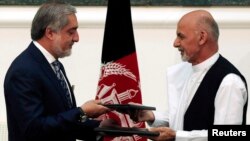Afghanistan's election commission has declared former finance minister and ex-World Bank economist Ashraf Ghani president-elect on Sunday, hours after he signed a power-sharing deal with runner up Abdullah Abdullah.
However, the commissioner withheld final election numbers after a U.N.-monitory audit.
The announcement Sunday followed Ghani and rival Abdullah Abdullah signing a power-sharing agreement to form a national unity government, ending weeks of political bickering following a June 14 runoff presidential election.
“The Independent Election Commission of Afghanistan declares Dr. Ashraf Ghani ... as the president of Afghanistan,” commission chief Ahmad Yousuf Nuristani said.
The full results would be provided at a later date, Nuristani said, but did not say when. He acknowledged deep flaws in the June 14 run-off vote and said a U.N.-supervised audit was not adequate to weed out all the vote-rigging.
“Although the audit was comprehensive ... (it) could not detect or throw out fraud completely,” Nuristani said, without taking further questions.
Power-sharing deal
The power-sharing signing ceremony took place at the presidential palace in Kabul with outgoing President Hamid Karzai and Afghan elders as well as religious leaders present on the occasion.
Ghani’s inauguration ceremony is scheduled for September 29.
The two candidates shook hands and hugged each other after signing the long-awaited political deal.
Karzai then briefly addressed the gathering and congratulated both Ghani and Abdullah on reaching the arrangement.
“We hope that you [candidates] can continue the things that the current government started," the outgoing president said.
Karzai has been in power since the U.S.-led coalition ousted the Taliban from power in late 2001.
Karzai added, “We [the government] are not involved in the content of the power-sharing deal. It is their responsibility. I hope they do what I could not.”
Guidelines of deal
The agreement makes Ghani president and creates a chief executive position similar to that of prime minister for Abdullah.
The agreement also requires Ghani take a series of executive actions immediately as president to dilute his own power in order to make permanent the CEO position.
The two will share control over who leads key institutions such as the Afghan army and other executive decisions.
The new administration faces huge challenges in fighting an emboldened Taliban-led insurgency and paying its bills amid plummeting tax revenue.
It will also face significant difficulty in improving the lives of Afghans who face hard times as aid flows fall and as contracts with the NATO-led coalition dry up as most foreign troops leave by the end of the year.
Exact details of the agreement have yet to be made public.
Karzai said his government was not involved in the content of the power-sharing deal, that it was finalized between the two candidates, and they are solely responsible for it.
Afghans mixed over news
While Sunday’s developments have brought a sigh of relief to the war-torn country and its international backers, reaction on the streets in the Afghan capital has been mixed.
Kabul resident Rahmatullah told VOA he welcomes the good news because the people of Afghanistan were worried about the election deadlock. Now that the candidates have sorted it out, however, it is a good day for the country.
Others residents, like Sharifullah, expressed disappointment.
Sharifullah said Afghans are happy the two candidates have finally signed the deal, but they are also sad because it has undermined principles of democracy in Afghanistan.
He added that the hardships Afghans suffered while voting under extremely difficult conditions have all gone to waste.
NATO, UN, US reactions
One of Ghani's first acts would be to sign a long-delayed bilateral security agreement with the United States to allow a small force of foreign troops to remain in Afghanistan after 2014.
Both the U.S. and U.N. congratulated the candidates Sunday.
A White House statement said, "Signing this political agreement helps bring closure to Afghanistan’s political crisis, and restores confidence in the way forward. We support this agreement and stand ready to work with the next administration to ensure its success."
On Sunday, State Department Secretary John Kerry issued a statement saying, "The inauguration of the new President, appointment of his Chief Executive, and the signing of the Bilateral Security Agreement and NATO SOFA will open a new chapter in (in the U.S.'s) enduring partnership with Afghanistan."
Kerry praised Ghani and Abdullah, saying they have “put the people of Afghanistan first, and they have ensured that the first peaceful democratic transition in the history of their country begins with national unity."
The U.N. described the power-sharing agreement "as an important step to move the country towards a period of stability."
UN statement
The head of the U.N. mission Kabul, Jan Kubis, said in a statement, "the uncertainty of the past months has taken a heavy toll on Afghanistan's security, economy and governance. For the sake of the country it is time to quickly implement the agreement on a government of national unity."
The political power-sharing deal was finalized after more than two months of tumultuous negotiations between presidential candidates collapsed. Negotiators from the two sides met late Saturday with senior U.N. officials to write a draft agreement.
The election crisis has deepened Afghanistan’s economic, security and ethnic troubles as the U.S.-led military coalition prepares to withdraw from the country, leaving Afghan security forces to fight the Taliban insurgency.
The first round of presidential election was held in April and Abdullah emerged as the lead candidate, but did not win enough votes to avoid a runoff against Ghani, who finished second.
The preliminary results from the June 14 runoff election put Ghani far ahead with 56 percent of the vote. That outcome triggered angry street protests from supporters of Abdullah who alleged massive fraud.
Some material for this report came from Reuters.









